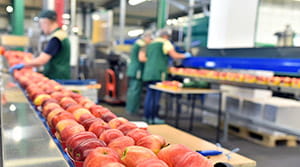Harvesting Success in Food Manufacturing

The hardworking industries that fill grocery aisles and put food on restaurant and household tables include growers and manufacturers, processors and packagers, as well as importers and exporters. While these businesses are often interrelated, the challenges they face can vary greatly.
Food and beverage producers are challenged to do the following and more:
- Find and keep skilled workers
- Plan around growing seasons and disruptions such as wildfires, drought and storms
- Manage workflow and production around food fads and nutrition trends
- Manage around changing regulation and tariffs. Keeping up with the FDA Food Safety Modernization Act alone requires logistical management, refined processes, detailed tracking and documentation, and investment in related technology.
- Tackle everyday decisions on expanding or retooling operations
If you run a food manufacturing or related business facing these challenges, here are five steps to help your company maintain agility and thrive in an ever-shifting arena:
- Surround yourself with knowledgeable experts. A reliable team of internal and external advisors such as accountants, attorneys and engineers can guide you on important decisions. Including an experienced banker on your team can help you prepare for and manage change.
- Make the most of financial reporting. Your profit and loss statement (P&L) and balance sheet provide a snapshot of your company’s financial performance, and can assist you in measuring profitability, forecasting the future and improving performance.
- Keep tabs on company debt. By tracking your company’s debt and holding it at reasonable levels, you’ll be in a better position to discuss options for paying it down or planning for increased capacity.
- Optimize your cash flow. An experienced banker can provide an independent analysis as well as tips and tools to gain financial efficiencies. Even in a production upswing, it’s important to look for ways to save and improve your cash flow.
- Have a plan to expand or retool your operations. You’ll gain the agility to quickly increase capacity for new opportunities or adjust in a downturn. Talk with a banker who understands your business to be sure you have the credit facilities and structure in place to support your plans when you’re ready to act.
Remember, you don’t have to go it alone. With a trusted team, including a knowledgeable banker, you can prepare to weather the storms and ride the high tides.
Author and Commercial Banker Brad Buchholz once owned a light manufacturing and distribution business, and is active in Food Northwest, an association of food industry professionals.




















